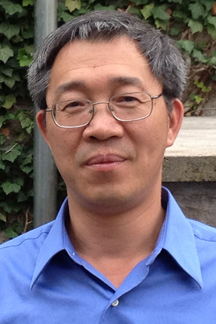Innovative Scientist Joins Neuroscience Department
The Scripps Research Institute (TSRI) has appointed Baoji Xu as a professor in the Department of Neuroscience. Before joining Scripps Florida this month, Xu was an associate professor at the Georgetown University Medical Center in Washington, DC.
“I would like to welcome Baoji to Scripps Florida,” said Ron Davis, chair of the Department of Neuroscience. “His pioneering work with neurotrophins, particularly with neurotrophin brain-derived neurotrophic factor, has been key in shining some much needed light on neurodegenerative conditions—and how we might develop new therapeutic strategies to fight them.”
“I’m excited to join the Scripps Florida faculty, which is known for its high-impact scientific research and great strength in drug discovery,” Xu said. “I look forward to many fruitful collaborations with my new Scripps colleagues.”
Xu earned a bachelor’s degree from Xiamen University in China in 1983, a master’s degree from Shanghai Institute of Plant Physiology, Chinese Academy in 1986, and a Ph.D. from Stanford University in 1995. His doctoral dissertation research in the laboratory of Professor David Clayton involved understanding the mechanisms that control replication of mitochondrial DNA, with support of a predoctoral fellowship from the Rockefeller Foundation.
Xu did his postdoctoral training in the laboratory of Professor Louis Reichardt at the Howard Hughes Medical Institute, University of California, San Francisco, from 1996 to 2001, studying the role of neurotrophins in the cerebral cortex and in weight control. After briefly working on the development of obesity therapeutics at Chiron Corporation (currently Novartis Emeryville Research Center in California), Xu joined Georgetown University as an assistant professor in 2003.
At Georgetown University, Xu carried out a highly successful research program and published many papers in prominent journals. He received an American Heart Association Scientist Development Award and was funded by numerous grants from the National Institutes of Health, American Diabetes Association, Klarman Family Foundation, March of Dimes Foundation and Whitehall Foundation.
At TSRI, Xu’s work will revolve around three research topics: local protein synthesis in dendrites (branch-like extensions on nerve cells), which has been implicated in the formation of long-term memory; central control of body weight and glucose homeostasis; and the mechanisms behind neurodegenerative diseases such as Alzheimer’s and Huntington’s.
Xu is married with a teenage daughter and a son. After his daughter’s graduation from a Maryland high school next year, the rest of the family will join him in Jupiter.
Send comments to: press[at]scripps.edu














